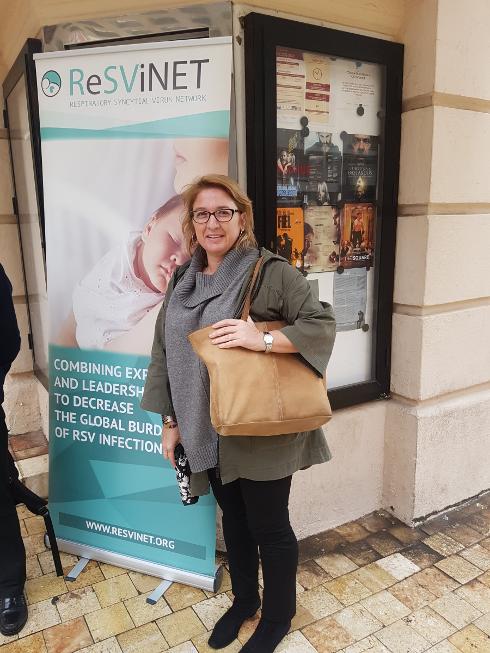“A vaccine against the virus that causes bronchiolitis could be a reality in five years”
This scientist from Malaga has spent 20 years in the USA researching RSV and she says her objective is to discover a treatment
AGUSTÍN PELÁEZ
Lunes, 11 de diciembre 2017, 10:14
Malaga. Asunción Mejías, who studied medicine at Malaga university and has worked in the paediatric department at the Gregorio Marañón hospital in Madrid, has been in the USA since 2001, carrying out research into the human respiratory syncytial virus (RSV). She is now a world expert on the subject, and last week she organised the ResVINET conference in Malaga to bring together the greatest experts on RSV, an infection that is the second most common cause of infant mortality. The aim was for the more than 300 participating researchers to share their knowledge, and see what can be done to develop vaccines against RSV.
What is respiratory syncytial virus, exactly?
It is a virus which causes bronchiolitis in children. In some it can start with catarrh, but in most cases it progresses and affects a lung. It is one of the most common causes of hospitalisation of children in their first year of life, in Spain and the world in general.
Does it only affect children?
No, adults as well. What happens is that when it occurs in adults it is more viral, a little less benign. An adult's lung is more developed, and they also have a certain degree of immunity.
Which time of year is the most problematic?
In Spain and the rest of Europe it is a winter virus; it starts in late October or early November and lasts until the cold weather ends. The winter months, in other words. In some tropical countries it exists all year round.
What makes RSV different from other viruses?
This virus leaves no memory. When someone gets measles or chickenpox, they get it once, but with respiratory syncytial virus children can be infected several times. It can also be the case that the first time the virus comes into contact with the host, the baby's condition is serious. In developed countries they are admitted to hospital, but in undeveloped or developing countries they aren't, and they can die.
Why is this virus so dangerous for children?
Malaria is the main cause of child mortality, and RSV is the second. It is a huge problem in a child's first year of life. Also, as people get older, it can be very serious in the elderly. Children don't have a developed immune system and in elderly people the immune system wears out.
Is it contagious?
Yes, very contagious. It is transmitted through contact, through secretions. It's very difficult to stop it being transmitted. Washing your hands is the most important thing.
Is there any effective treatment?
So far the treatments tend to be supportive. Fundamentally, in serious cases: oxygen, intravenous liquids and suction of the secretion. However, in the past five years great efforts have been made to develop new therapies and vaccines, and new antivirals as a treatment.
Strategies for prevention
What is the research into RSV focusing on?
On prevention. There are different strategies. The worst age is two months, when the immune system is still very immature. There is a small risk in giving a vaccination, which can sometimes have a negative effect of some type. What we are thinking of is vaccinating mothers, as we do for flu or whooping cough, so it is passively transferred to the baby and later, when the baby is six months old, giving another type of vaccine. Another strategy is to develop antibodies, which can be given to the baby at birth and can prevent the infection during the first five or six months of life. But all this is still in development and being researched.
And what about elderly people?
We are at a stage in which there is a great deal of emphasis on this and many foundations and specialist companies want to produce vaccines, because RSV is a very serious virus. The World Health Organisation has set itself the objective of finding a vaccine.
What are the other effects?
We know that when a baby is infected, and it is a serious infection, about 50 per cent will develop episodes of wheezing afterwards. Those can last until they are 11 years old, and they are very intense in the first three years. There are studies which have shown that by giving monoclonal antibodies to prevent acute infections, these after-effects can be prevented. The impact this will have when RSV can be prevented or treated will be enormous.
Are monoclonal antibodies an effective treatment?
It is a preventive treatment. Until now the focus has only been on children at high risk. Now there is an attempt to develop new therapies which can be applied to the whole population.
When could there be a vaccine against RSV?
In five years we will have, at least, one type of vaccine, the maternal one. In five to ten years we will have developed some type of strategy, but it is not easy. First we need to find out exactly how the virus acts. The effort is enormous. In my case, we are working in the United States to develop a vaccine which can be given to an older baby intranasally. It's an attenuated virus vaccine. There are different vaccines, depending on the target population. There are about 50 projects under way at present.
